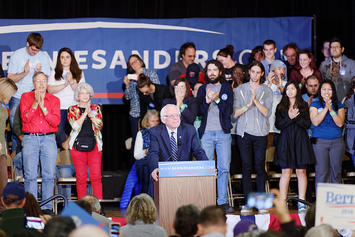
Until now, the presidential campaign largely has been dominated by issues of class, driving the improbable rise of both Donald Trump and Bernie Sanders. But as we head toward Super Tuesday – which will focus largely on Southern states – racial issues may assume greater importance.
In the next few weeks, you can pick your states and likely party primary winners largely by examining the ethnic profiles of the electorate. Where white voters predominate, the most radical candidate, Sanders, ironically, does best. In contrast, states that are more heavily minority favor the more mainstream Hillary Clinton. In some states, notably Texas and Florida, larger minority representation may slow Trump’s seemingly unstoppable momentum.
What about age? Older voters are overwhelmingly white, and in states where they constitute a large share of the electorate – a full one-third of GOP caucus-goers in Nevada – the Donald is the bomb. Hillary, too, has done best with older voters, while Sanders dominates the party’s younger electorate.
Racial gap in Democratic Party
Racial divisions will shape the Democratic results Super Tuesday. The party’s Southern flank, weak in November but important now, tends to be dominated by African Americans and, in Texas, at least, also Latinos. In some states, like South Carolina, where African Americans constitute upward of a majority, Clinton has proven all but unbeatable.
In contrast, Clinton did poorly in New Hampshire (94 percent white) and barely earned a tie in Iowa (92 percent white). Generally speaking, the whiter the state, the better things tend to appear for Sanders.
Read the entire piece at The Orange County Register.
Joel Kotkin is executive editor of NewGeography.com. He is the Roger Hobbs Distinguished Fellow in Urban Studies at Chapman University and executive director of the Houston-based Center for Opportunity Urbanism. His newest book, The Human City: Urbanism for the rest of us, will be published in April by Agate. He is also author of The New Class Conflict, The City: A Global History, and The Next Hundred Million: America in 2050. He lives in Orange County, CA.
Bernie Sanders photo by Michael Vadon (Own work) [CC BY-SA 4.0], via Wikimedia Commons













If it's Trump against
If it's Trump against Clinton in the fall I see the Dems running on race & gender, the Repubs on class. My guess, my hope, is that class will trump race & gender, and that we will see a significant crossover of Dems and Independents voting for a new kind of liberal nationalism in America that puts the welfare working people first. In concrete terms that means clamping down on mass low-skilled third-world immigration and restricting trade with low-wage countries like China. Surprising numbers of working-class African-Amercans and Hispanics will be drawn to these policies because they promise more and better employment opportunities.
In short, there will be a fundamental realignment of American politics. The celebration of diversity will be discredited as an elite strategy to undermine democracy. Multi-culturalism will be out, assimilation in. The re-uniting of America will begin.
Luke Lea